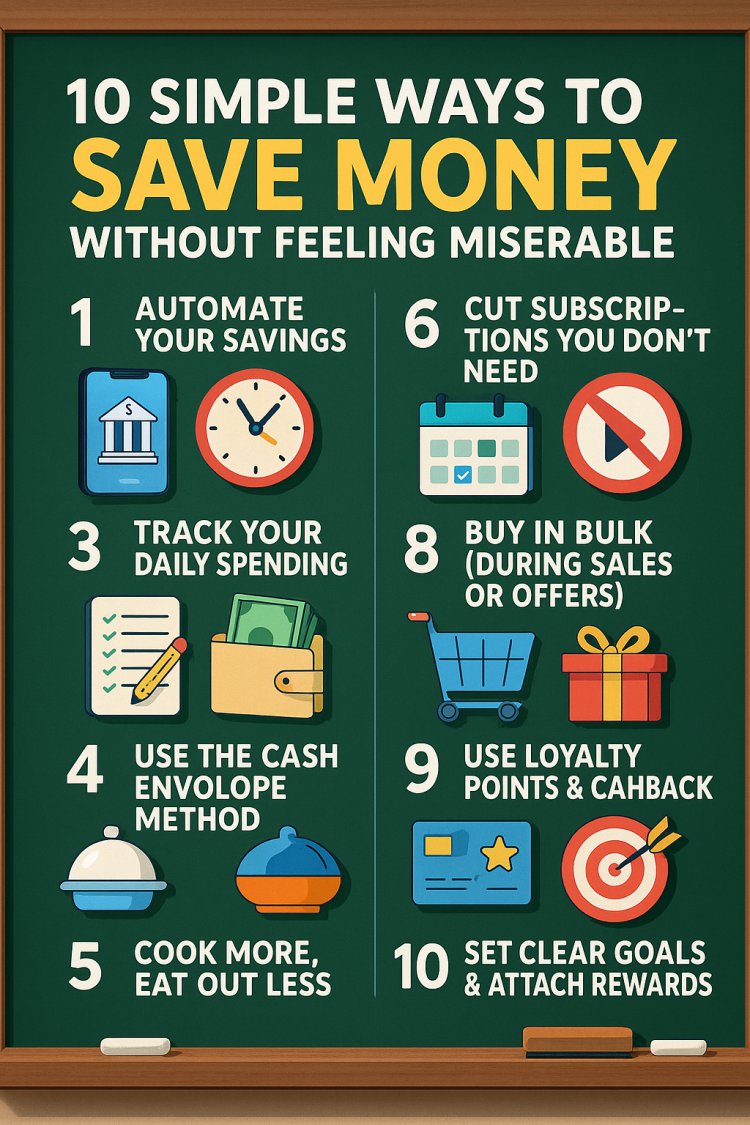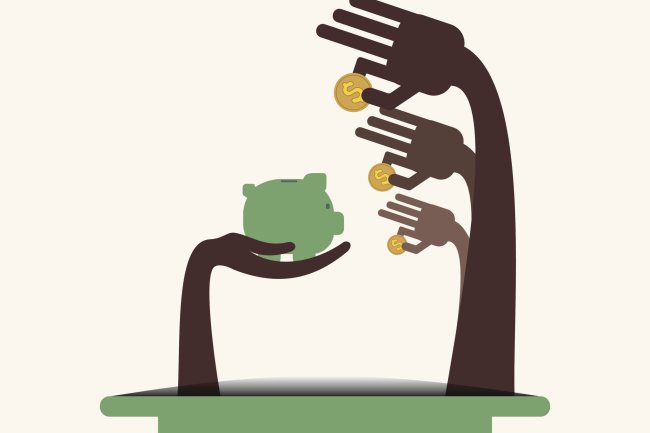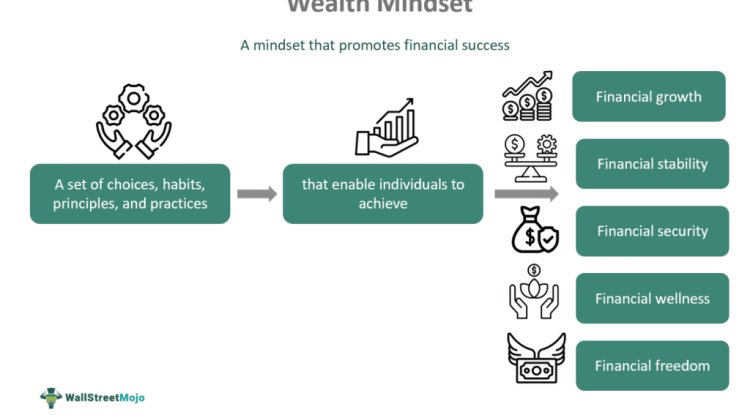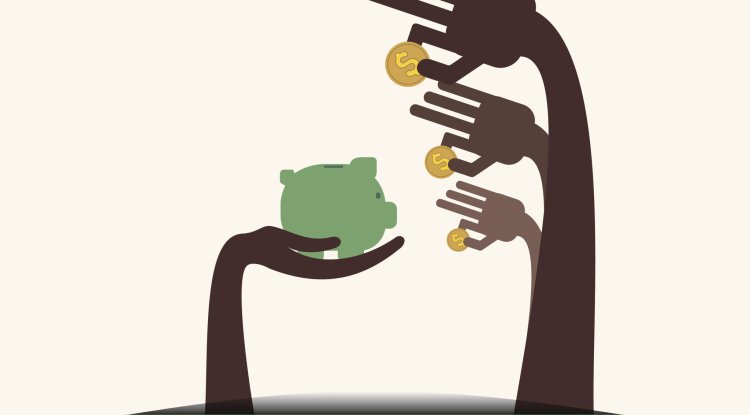10 Simple Ways to Save Money Without Feeling Miserable
Think saving money means missing out on life? Think again. This article reveals 10 easy and realistic ways to save money—without feeling deprived or miserable. From automating your savings to smart spending habits, you’ll discover strategies that actually work for real people. Start small, stay consistent, and build the financial life you deserve.

Saving money is one of the smartest things you can do for your financial future—but for many people, it feels like a punishment. The idea of giving up the things you enjoy, living like a monk, or constantly denying yourself can be discouraging.
But here's the truth: Saving money doesn't have to feel like suffering. With a few simple shifts and smart habits, you can stash away cash consistently—without feeling like you’re sacrificing your happiness.
Let’s explore 10 practical ways to save money easily and still enjoy life.
1. ✅ Automate Your Savings
One of the most effective ways to save money is to remove willpower from the equation.
Set up an automatic standing order or mobile money transfer to move a fixed amount from your income directly into a savings or investment account the moment you get paid.
-
This could be KES 500, 1000, or even 5% of your income.
-
You won't even miss it when it’s done automatically.
-
You train yourself to live on what's left.
Tip: Open a separate bank or SACCO account where you don't have easy access to the funds. Let it grow quietly in the background.
2. Practice the 24-Hour Rule for Non-Essential Purchases
Impulse purchases are a silent killer of budgets.
Next time you want to buy something that isn't urgent, wait 24 hours before making the decision.
-
Most cravings fade with time.
-
You’ll avoid buyer's remorse.
-
You spend more intentionally.
This single rule has saved people thousands—simply by adding a pause between desire and action.
3. Track Your Daily Spending
What gets measured, gets managed.
If you don't know where your money goes, you'll never know how to control it. Tracking your spending helps you:
-
Identify wasteful habits
-
Understand your true expenses
-
Make better choices
Use tools like:
-
Expense tracking apps (Money Manager, Spendee, etc.)
-
A simple notebook
-
M-Pesa or bank transaction summaries
Goal: Know how much you spend on food, transport, bills, entertainment—weekly and monthly.
4. Use the Cash Envelope Method
Old-school but highly effective.
Withdraw a portion of your income in cash and divide it into labeled envelopes:
-
Transport
-
Groceries
-
Entertainment
-
Church/Giving
Once the cash is finished from an envelope—you stop spending in that category until the next period.
Why it works:
-
You visually see money leaving.
-
Helps limit overspending.
-
It builds awareness and discipline.
5. Cook More, Eat Out Less
Eating out regularly may seem small, but it adds up fast. A daily lunch at KES 300 is over KES 9,000 a month.
Instead:
-
Pack your lunch to work.
-
Cook larger portions and freeze leftovers.
-
Explore local recipes that are tasty, healthy, and affordable.
You don’t have to become a master chef—just learn a few staple dishes and rotate.
6. Cut Subscriptions You Don’t Need
Are you paying for things you don’t use or need?
Review your subscriptions:
-
Netflix, DSTV, Spotify, Showmax
-
Mobile apps
-
Gym or clubs
Cancel or pause the ones you rarely use. For the necessary ones:
-
Share family plans
-
Downgrade to cheaper tiers
-
Explore free alternatives (YouTube, local libraries, podcasts)
Your rule: If you haven’t used it in 30 days, cut it.
7. Try 'No Spend' Weekends
A powerful yet fun strategy.
Designate one weekend each month as a "no spend weekend." That means:
-
No eating out
-
No shopping
-
No paid entertainment
Instead, focus on:
-
Free parks or nature walks
-
Watching documentaries or DIYs
-
Reading, journaling, cleaning, or meditating
You’ll be amazed at how much fun you can have—for free—and how much money you save.
8. Buy in Bulk (During Sales or Offers)
Buying things in bulk or on sale saves more than you think—especially:
-
Toiletries
-
Grains and cereals
-
Cleaning supplies
-
Non-perishable goods
Avoid daily "corner shop" purchases that are more expensive. Instead:
-
Plan a monthly or bi-weekly bulk shopping trip.
-
Compare prices across stores or use apps like Jumia, Naivas, Carrefour, or Quickmart promotions.
Think long-term. Stock smart. Save consistently.
9. Use Loyalty Points, Cashback & Discounts
Take advantage of reward systems:
-
Supermarkets with loyalty cards (Naivas Rewards, Carrefour Club, etc.)
-
Telco points (e.g. Bonga Points)
-
Cashback apps or digital coupons
Also:
-
Compare before you buy (shop around online)
-
Use student, senior, or special discounts if eligible
-
Stack promo codes
Saving money isn’t just about cutting back—it’s about using leverage too.
10. Set Clear Goals & Attach Rewards
It’s hard to save money when it feels like a chore.
So flip the game:
-
Set a target: “I’ll save KES 30,000 in 6 months.”
-
Break it down: “That’s KES 5,000/month.”
-
Track it visually: Chart, calendar, or app.
-
Celebrate progress: When you hit halfway, treat yourself with a movie or something small.
Goals give you motivation.
Rewards give you dopamine.
Together, they make saving feel empowering rather than restrictive.
Real-Life Example: Meet Mary, a Smart Saver
Mary, a 28-year-old from Nairobi, used to feel broke by the 20th of every month. After applying just 4 of these tips, she managed to:
-
Build an emergency fund of KES 50,000 in 6 months
-
Cut her entertainment budget by 40% without sacrificing fun
-
Avoid debt for the first time in 2 years
“Saving didn’t feel like torture anymore. I just became more intentional.” – Mary W.
Final Thoughts: Saving = Self-Respect
Saving money doesn’t have to feel like punishment. It’s not about what you’re giving up—it’s about what you’re gaining:
-
Peace of mind
-
Freedom
-
Options
-
A future
The key is to make it simple, automatic, and lifestyle-friendly.
Start with one or two tips from this list. Build momentum. Then stack more as you go.
And remember: You’re not just saving money—you’re building wealth, one smart habit at a time.
What's Your Reaction?




















